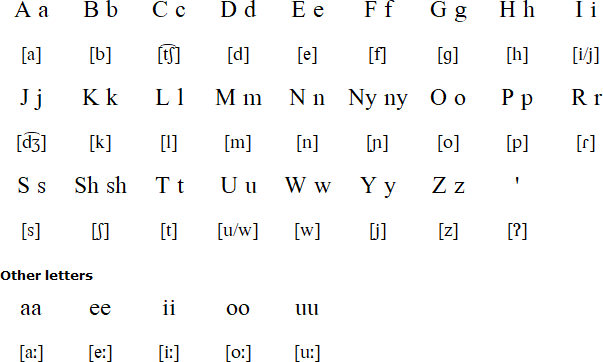Haya is a member of the Northeast Bantu branch of the Niger-Congo language family. It is spoken by about 1.94 million people in northern Tanzania, particularly in the Bukoba urban and rural districts in the Kagera region to the south and southwest of Lake Victoria.
Haya is also known as EkiHaya, Ekihaya, Ekihâya, Kihaya, Oluhaya, Oluhâya, Ruhaya or olu-Haya. Native speakers call it OluHaya.
Haya is written with the Latin alphabet, and is used in literature to some extent.

Download an alphabet chart for Haya (Excel)
Source: https://www.bible.com/sr/bible/3040/JHN.1.RHAY01
Source: https://www.bible.com/sr/bible/1/JHN.1.KJV
Information about Haya | Tower of Babel
Information about Haya
https://en.wikipedia.org/wiki/Haya_language
https://www.ethnologue.com/language/hay
http://www.language-archives.org/language/hay
https://duranti.scholar.ss.ucla.edu/wp-content/uploads/sites/13/2021/01/Byarushengo-Duranti-Hyman-1977-Haya-Grammatical-Structure.pdf
Aka, Bafaw-Balong, Bangi, Basaa, Bemba, Bembe, Bena, Benga, Bhaca, Bube, Bukusu, Bulu, Central Teke, Chichewa, Chokwe, Chuwabu, Comorian, Dciriku, Digo, Duala, Eton, Ewondo, Fang, Ganda/Luganda, Gogo, Gusii, Gwere, Haya, Hehe, Herero, Ibinda, Ikizu, Ikoma, Jita, Kabwa, Kako, Kamba, Kiga, Kikuyu, Kimbundu, Kinyarwanda, Kirundi, Kisi, Kogo, Komo, Kongo, Konjo, Koti, Kukuya, Kunda, Kuria, Kwambi, Lambya, Lingala, Loma, Lozi, Luba-Katanga, Luchazi, Lunda, Luvale, Luyana, Makaa, Makonde, Makhuwa, Mandekan, Maore, Masaaba, Mbama, Mbere, Mbukushu, Mbunda, Mbuun, Mende, Mongo, Mpiemo, Mushungulu, Mwani, Nambya, Nande, Ngoni, Nkore, North Teke, Northern Ndebele (South Africa), Northern Ndebele (Zimbabwe), Northern Sotho, Nyamwezi, Nyakyusa, Nyemba, Nyole, Nyoro, Nyungwe, Nzadi, Oroko, OshiWambo, Pagibete, Punu, Ronga, Safwa, Sena, Sengele, Shona, Soga, Songe, Southern Ndebele, Southern Sotho, Sukuma, Swahili, Swati, Tanga, Tembo, Tonga, Tooro, Tshiluba, Tsonga, Tswa, Tswana, Tumbuka, Umbundu, Venda, Vili, Vwanji, Xhosa, Yakam, Yansi, Yao, Yasa, Yeyi, Zigula, Zinza, Zulu
Languages written with the Latin alphabet
Page created: 18.04.22. Last modified: 18.04.22
[top]
You can support this site by Buying Me A Coffee, and if you like what you see on this page, you can use the buttons below to share it with people you know.

If you like this site and find it useful, you can support it by making a donation via PayPal or Patreon, or by contributing in other ways. Omniglot is how I make my living.
Note: all links on this site to Amazon.com, Amazon.co.uk
and Amazon.fr
are affiliate links. This means I earn a commission if you click on any of them and buy something. So by clicking on these links you can help to support this site.
[top]